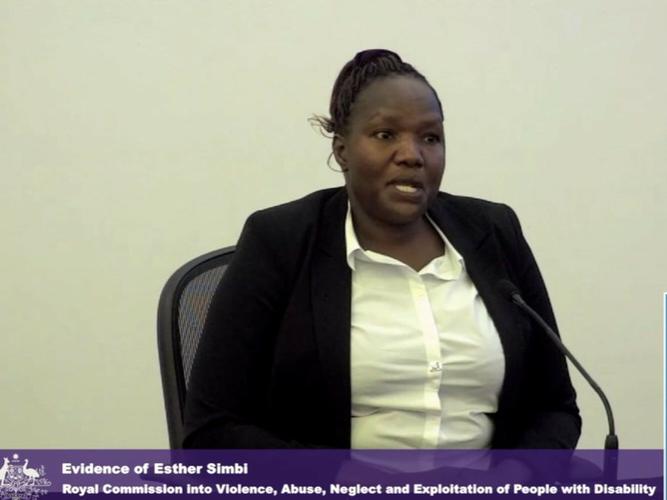Esther Simbi is a refugee, disability rights advocate and social worker who spoke before the Commission. [Source Royal Disability Commission]
The Royal Commission on Violence, Abuse, Neglect and Exploitation of People with Disabilities heard that people from cultural backgrounds who live with a disability are often isolated and mistreated within their communities, and feel frustrated when they have access to the National Disability Insurance Scheme (NDIS).
The Disability Royal Commission concluded its 29th public hearing today in Melbourne to examine the experiences of violence, abuse, neglect and exploitation of people with disabilities from culturally and linguistically diverse (CALD) communities.
The five-day hearing featured multiple witness statements from CALD people with disabilities, including people from the deaf, deafblind and hard of hearing community who identify as CALD.
For the first time in the history of the Australian Royal Commission, the hearing was opened in Auslan.
CALD People with disabilities face ongoing barriers
A dominant theme of this week’s Royal Commission was that CALD people with disabilities often tried to access services that did not understand their cultural needs.
Australia’s Race Discrimination Commissioner, Chin Tan, spoke to the Commission about initiatives to eradicate racism and strategies to promote the inclusion of people with disabilities from multicultural communities.
He says that participants in the community consultations described the disability sector as “very European”.
“Ensuring cultural safety, respect and inclusion for culturally and linguistically diverse people is paramount,” Mr. Tan said.
This was mirrored by witnesses, refugees and caregivers who told the Commission that services, such as the NDIS, alienate them instead of helping them.
Witness M. Rahman (pseudonym) detailed his experience as an asylum seeker living with a disability and how he was detained on Christmas Island.
The 36-year-old was born in Bangladesh, but his doctor’s orders to stay in Australia for treatment were ignored by authorities and he was sent back to Christmas Island.
“It was humiliating to be handcuffed and treated like a criminal,” Mr. Rahman told the Commission through an interpreter.
“I felt like I participated in criminal activity just because I was a disabled person.”
He detailed his detention in Nauru until 2019 when he was transferred to Australia under the Medevac programme, saying he often went without food as he could not wait in line.
When he was finally released into the Melbourne community on a bridging visa, Mr Rahman found it difficult to access disability services.
Unable to work due to his disability, he became homeless and had to eat from rubbish bins for two months when his Centrelink payments and free housing stopped.
Esther Simbi, another refugee, disability rights advocate and social worker from South Sudan, took the witness stand again, having previously spoken at Hearing 17 of the Royal Commission on disabled people.
Ms. Simbi told the Commission that from her experience as a person living with post-polio syndrome and from her work, she found that many CALD communities were unaware of the NDIS and had difficulty understanding it. due to language and cultural barriers.
She said that in her culture, it was often the responsibility of other family members to make important decisions for a person with a disability, such as a woman’s husband or her older siblings, whom she calls “caretakers”. .
With that in mind, she told the Commission that it was important for NDIS support workers to have more cultural training to understand the needs of CALD participants and their families, and to be able to spot signs of abuse from the family.
CALD people with disabilities are more likely to experience inequalities
A panel of experts discussed the systemic abuse, neglect and exploitation of people with disabilities from CALD backgrounds, as well as shared personal stories and testimonies from the communities they represent, to the Royal Commission.
People with Disability Australia (PWDA), the National Ethnic Disabilities Alliance (NEDA) and the Federation of Ethnic Community Councils Australia (FECCA) have all helped people with disabilities who have encountered barriers due to their cultural background.
“People with disabilities from CALD backgrounds are more likely to experience inequality, discrimination, abuse, neglect and exploitation,” says Dwayne Cranfield, CEO of NEDA.
Giancarlo de Vera, senior policy director at PWDA, agreed, saying ableism affects the entire disability community but is compounded by structural and interpersonal racism.
FECCA CEO Mohammad Al-Khafaji said: “The Royal Commission has found that Australia falls far short of meeting its international human rights obligations in relation to people with disabilities, and those of of us from CALD face additional barriers to equality.
Hands of deaf people are tied
During the early days of the Commission, witnesses from the deaf, deafblind and hard of hearing community shared their experiences of Auslan or sign language, and the impact of being language deprived.
Deaf woman Natalie Sandon-Stanhope has testified about her experiences in elementary school, where Auslan was banned.
“Our hands had to be sitting in class,” says Ms. Sandon-Stanhope. “We had to use our lips to speak.”
Ben McTamaney from Deafblind Australia told the Commission how harmful these types of exclusions are, causing young people with hearing loss to have their options capped prematurely.
“We hear about a very firm ceiling being placed on the potential of children at an early age. And that can lead to all kinds of problems,” he says.
This sentiment was echoed by Dr. Breda Carty AO, an expert and witness to lived experience, who stressed the importance of schools for people with hearing loss.
“Deaf schools are historical and cultural sites for the deaf community because it is where Auslan is passed down through the generations, from child to child,” she says.
“The strength of our language today is due to the existence of these schools.”
The dates for the next Royal Commission hearings have not yet been announced. For continued coverage of the Royal Commission on Disabled Persons, subscribe to the Newsletter Let’s talk about disabilities.

